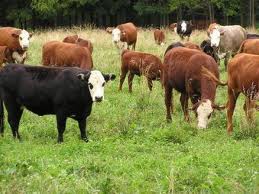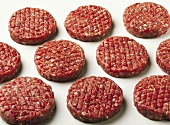While chatting about trends in organic food, my friend Sandra boldly declared, “I don’t care if it’s grass fed or spoon fed. I just want to know if it tastes good.”
 She has a point. If it doesn’t taste good, the discussion ends there. However, organic meat does taste good, very good. So if that’s all you need to know, consider the issue resolved. If you still aren’t sure why you’d want to pay more to get the good stuff, you may want to know a bit more about what you’re actually eating when you sit down to that nice, juicy steak.
She has a point. If it doesn’t taste good, the discussion ends there. However, organic meat does taste good, very good. So if that’s all you need to know, consider the issue resolved. If you still aren’t sure why you’d want to pay more to get the good stuff, you may want to know a bit more about what you’re actually eating when you sit down to that nice, juicy steak.
As I’ve become more aware of what’s involved in meat production, I’ve also become much more keen to source organic, grass fed beef for the occasions I choose to eat it.
Organic
 On the organic side of the equation it boils down to this: the last thing I want entering my body is genetically modified corn, pesticides (sprayed on the corn), hormones and antibiotics, passed down to me in the form of beef.
On the organic side of the equation it boils down to this: the last thing I want entering my body is genetically modified corn, pesticides (sprayed on the corn), hormones and antibiotics, passed down to me in the form of beef.
- Cows in the industrialized meat industry are fed GMO corn.
- Corn is a grain, which cow stomachs are not designed to digest.
- Mass-produced cattle are also fed animal by-products. Note: cows are herbivores. Feeding them their kin is messed up on many levels. Remember “mad cow” disease…
- Cows are ruminants, they chew their cud. In the industrialized food process, cows are kept closely packed together and cannot lie down to chew their cud.
- Cows are kept in such close quarters and in such great numbers that disease is easily spread, hence the heavy dosing of antibiotics.
- The only priority in commercial farming is profit, so cows need to fatten up quick. That’s where the growth hormones come into play.
Cutting out the carcinogenic chemicals and going organic was a no-brainer, especially when I learned that all the nasty stuff collects in the fat of the animal. Fat is also what gives food its flavour so if you want tasty meat, you are eating fat.
Grass Fed
Then there’s the “grass fed” part of the equation. Why not choose beef that’s organic and be done with it? Or choose “naturally raised” beef?
Well, if you’ve never seen how mass-produced cattle are raised, just wonder for a moment why it’s called “factory farming.” Really, it’s just like that. No pastoral scene of mother and calf, this.
- Grass fed cows eat grass. Not grain and not other cows. That’s more healthy.
- Grass fed means a cow has had access to grass. In a field. At liberty. With other cows, doing what cows do.
- Cows need to chew their cud to digest their food. It’s what nature intended. In a field, there’s room for a little ruminating.
- Stockyards used to be where cowboys drove their cattle after life on the open range. Now, they may live almost their entire short life there. To me, that is inhumane.
- Cows are animals, not machines. The research is very clear — they have feelings, they need to socialize, they develop bonds. Providing them an opportunity to live without undo stress seems the least we can do.
If you are still one of the few who believe the treatment of animals is no big deal, you can hold to that opinion and still recognize the value of grass fed beef. When I thought that way, I still couldn’t believe there was much nutritional value in a cow eating food it was never meant to eat, in an unnatural environment.
The Final Word
Don’t take my word for it that. You need to know enough to decide what matters to you. Just don’t stay in the dark about where your food really comes from.
The resources are endless, but here are a few to get you started:
Our Daily Bread the Movie
FRESH the Movie
King Corn the Movie
Food, Inc. the Movie
The Food Revolution by John Robbins
The Omnivore’s Dilemma by Michael Pollan
Ecoholic by Adria Vasil
Readers, I welcome your comments on books, movies or other resources you’ve found helpful in understanding all that goes into choosing healthy food. Please leave a comment and share…



